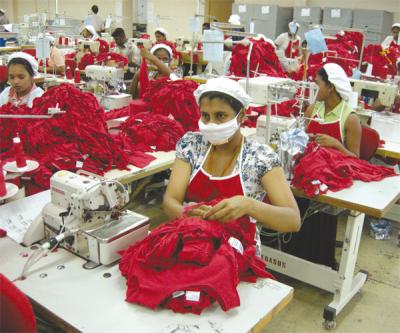In a move that will benefit the textile industry in Mauritius, a key committee in the U.S. Senate voted last Wednesday to renew an expiring Africa trade provision that has boosted Mauritian clothing exports to the United States over the past 10 years.
The Senate Finance Committee agreed to extend a provision of the African Growth and Opportunity Act (AGOA) that waives duties on garments from AGOA beneficiary countries that are made with inexpensive yarn imported from a « third country » like China, India or Vietnam.
African leaders and their allies in Congress said if the provision is allowed to expire on Sept. 30, virtually all apparel coming into the United States from Africa will no longer be cost competitive, and the African textile industry – which was largely created to export under AGOA — would collapse.
Uncertainty over whether the provision would be renewed has already caused a 30 percent drop in clothing orders from U.S. buyers and the loss of thousands of jobs since January, according to a coalition of African manufacturers and U.S. importers. Lesotho and Swaziland have been especially hard hit, and American companies have also cancelled orders from Mauritius.
The Senate committee action was a key phase of the extension process in Congress, as several senators, most notably Sen. Robert Menendez, a Democrat from New Jersey, had threatened to add amendments to the AGOA bill to benefit unrelated local industries in their states.
Supporters feared that these extra amendments would sink the bill, and AGOA supporters have been working for weeks to fend off such killer amendments. The Obama administration, which supports the AGOA extension, also contacted senators. Secretary of State Hillary Clinton and U.S. Trade Representative Ron Kirk have been especially active, as have members of the African diplomatic corps, including Mauritius ambassador Somduth Soborun, and groups like One Action Organization, founded by Irish singer Bono.
« This is a significant step because it clears the way for final passage of the extension, » Ambassador Soborun said after the vote. « And this will likely happen before Congress recesses in August. »
The bill has broad bipartisan support and is expected to pass easily if it gets to the floor in the Senate and the House of Representatives for votes. This could occur next week.
« A timely extension of this provision will help stem the tide of job losses in Africa and it will ensure that U.S. retailers will have the certainty they need to help their businesses succeed and grow, » said Sen. Max Baucus, a Montana Democrat who chairs the Senate Finance Committee.
« It is critical for workers and businesses in the U.S. and Africa that we extend this key provision before it is due to expire in September, » U.S. Trade Representative Ron Kirk said in a statement after the vote.
First passed by Congress in 2000, AGOA allows eligible countries in sub-Saharan countries including Mauritius to export thousands of goods to the United States without paying import duties. A majority of these products are clothing or textiles. These exports are valued at more than $800 million and have created some 300,000 jobs mainly in Lesotho, Swaziland, Kenya and Mauritius, according to a recent study by the Brookings Institution, a Washington think-tank. Madagascar’s textile industry also benefited until it lost AGOA eligibility following a political coup in 2009.
The overall AGOA law expires in 2015, and once the Third Country Fabric issue is resolved, attention will turn to extending the trade law until 2025. This will give countries like Mauritius extra time to figure out what to do when preferential trade between America and Africa is phased out, which is likely since AGOA was never intended to be a permanent program.
One option being pursued by Mauritius is to join other countries in Africa in creating a Free Trade Agreement with the United States that would allow special trading privileges. « You can’t always depend on (trade) preferences, » Ambassador Soborun said. « We are already looking at how to make a good transition from AGOA, should it stop at the end of 2025. »
Just as Congress was debating African apparel trade, another clothing controversy erupted in Washington. Last week it was revealed that the navy blue blazers designed by Ralph Lauren that American athletes will wear at Opening Ceremonies of the London Olympics were made in China – not the United States.
This caused a political uproar that raised issues of national identity and patriotism and spotlighted the lack of a national dress that sets the country apart. (Even the iconic Levi jeans aren’t made in America anymore, as the company closed its last U.S. plant in 2003.)
The controversy also exposed the sensitive issue of high unemployment in the U.S. manufacturing sector, especially two months before the presidential election. A group of outraged congressman was quick to introduce legislation that would require the U.S. Olympic Committee to outfit U.S. athletes in ceremonial uniforms « sewn or assembled in the United States. »
But if the bill becomes law, it will be a hard to enforce. About 98 percent of clothing sold in the United States is made overseas, according to the American Apparel and Footwear Association.
The issue is not a new. The Nike shoes and sportswear the U.S. athletes will wear during competitions are manufactured abroad, and uniforms worn by American athletes at previous Olympics were also made in China. Other countries to do the same. The uniforms designed by Stella McCartney for Team Great Britain this year were made in sweatshops in Indonesia.
It makes one wonder: what about outfits made for athletes participating from Mauritius? Will they carry a « Made in Mauritius » label?
MAURITIANS ON THE MOVE, AMERICAN STYLE: African trade measure advances in U.S. Congress
- Publicité -
EN CONTINU ↻
- Publicité -

